In the wake of the recent nationwide #EndBadGovernance protests that took place from August 1 to August 10, 2024, calls for the release of detained protesters are growing louder. Key figures, including Emeritus Catholic Archbishop of Abuja, Cardinal John Onaiyekan, along with various civil society organizations (CSOs) and Arewa youths, have joined forces to demand immediate action from the government.
Cardinal Onaiyekan, a respected religious leader, emphasized that the protesters are not the source of Nigeria’s problems but rather a symptom of the country’s deeper issues. He urged the government to engage in genuine dialogue with those who are discontented, rather than resorting to harsh measures.
“It is not unarmed protesters who are the cause of our problems,” Onaiyekan said, stressing that the government should take concrete steps to alleviate the suffering of the people, particularly the youth. He highlighted that many of the protesters are simply young Nigerians who are frustrated by the lack of opportunities and the economic hardships they face.
Renowned rights lawyer and chairman of the Alliance on Surviving Covid-19 and Beyond (ASCAB), Femi Falana, has also stepped into the fray, warning the Federal Government that his group will take legal action if the detained protesters are not either charged or released by August 25. Falana revealed that out of the 2,111 people arrested during the protests, 1,403 have been remanded in prisons across the country.
Falana’s statement, titled “Halt The Clampdown On Protesters,” criticized the government’s response to the protests and called for the immediate arraignment of the suspects in court. He also pointed out the glaring inconsistency in the justice system, where politically exposed persons often receive lenient treatment, while ordinary citizens face harsh repercussions for protesting.
Civil society organizations have expressed deep concern over the continued detention of protesters without trial. Auwal Musa Rafsanjani, head of Transparency International (Nigeria), condemned the government’s actions, noting that some of those detained were not even involved in the protests but were targeted in hospitals and other locations. Rafsanjani questioned the government’s motives, suggesting that the prolonged detention could be a tactic to siphon public funds under the guise of feeding the detainees.
The Civil Society Legislative Advocacy Centre (CISLAC) echoed these sentiments, warning that the continued detention of protesters could fuel further unrest. CISLAC urged the government to either prosecute those detained or release them, stressing that such actions are crucial for maintaining public trust and ensuring justice.
Beyond the immediate call for the release of protesters, these events have sparked a broader conversation about the state of human rights in Nigeria. Samson Itodo, Executive Director of Yiaga Africa, criticized the government’s approach, calling it a serious violation of democratic principles. He emphasized that the unlawful detention of citizens for protesting against government policies is unacceptable and undermines the very foundations of democracy.
Similarly, the Joint Action Front (JAF) has demanded the unconditional release of all detained protesters and condemned the government’s use of force. Dr. Oladipo Fashina, Chairperson of JAF, called for the resignation of the Inspector-General of Police and the prosecution of officers involved in the violent crackdown on demonstrators.
As tensions continue to rise, there is growing pressure on the government to act swiftly and justly. The Arewa Youth Assembly has warned that indefinite detention of protesters could lead to even larger demonstrations, further destabilizing the nation. They argue that the government’s failure to address the root causes of the protests—namely, economic hardship and political disenfranchisement—will only exacerbate the situation.
Rights lawyer Temi Salami described the ongoing detentions as unconstitutional, likening the current situation to the oppressive regimes of the past. Salami urged the government to respect the rule of law and ensure that all detainees are either charged within the legal timeframe or released.
As the government faces mounting criticism from all sides, the coming days will be crucial in determining how this situation will unfold. Will the authorities heed the calls for justice, or will they continue down a path that could lead to further unrest? The world watches as Nigeria grapples with these questions, hoping for a resolution that honors the rights and dignity of its people.
Source: Vanguard


